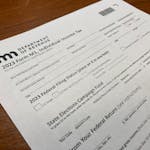Sun Country Airlines on Wednesday will become a public company, a takeoff that seemed quite unlikely for much of the plucky Minnesota airline's 40-year history.
The company priced its initial public offering at $24 a share Tuesday evening. It will raise around $218 million when its shares begin trading on Wednesday.
That price is above the $21-$23 range Sun Country proposed as it marketed the stock over the past month. It is also the first IPO for a Minnesota-based company in 2021.
Sun Country, based at Minneapolis-St. Paul International Airport (MSP), will trade on the Nasdaq under the symbol "SNCY." Executives said they will use the proceeds from the listing to repay a pandemic-related government loan and general corporate purposes.
"I am excited they are at this stage in their development," said Stan Gadek, who served as Sun Country's CEO from 2008 to 2013. "It's a natural step in their evolution to a bigger carrier — a viable carrier."
The listing is the climax of a tale of survival and growth for an airline started by former Braniff Airways pilots and flight attendants in 1983. Under multiple owners over the decades, Sun Country swung between operating as a charter carrier and a commercial airline.
Since Jude Bricker became its chief executive in 2017, the airline solidified as a hybrid operator and significantly expanded a contract cargo business.
This three-way business model — charter, cargo and commercial — is the sales pitch presented to potential investors in recent weeks.
Calling itself "a new breed of hybrid low-cost air carrier," Sun Country told prospective investors: "We believe our flexible business model generates higher returns and margins while also providing greater resiliency to economic and industry downturns than a traditional scheduled service carrier."
When Apollo Global Management bought the airline in 2018, it infused much-needed capital into Sun Country that allowed the airline to address structural issues — including outdated technology and overpriced aircraft leases — that hindered its growth.
By late 2019, Bricker and Apollo believed its freshened-up airline was ready for suitors, filing a nonpublic draft registration statement with the U.S. Securities and Exchange Commission just a few months before the pandemic brought air travel to a near-halt.
A year later, it was finally ready to go public, filing its formal registration on Feb. 8, 2021.
Sun Country's IPO means Minnesota will once again have a publicly traded airline.
The Twin Cities has a long and robust history in the industry, but its biggest carrier, Northwest Airlines, was purchased by Atlanta-based Delta Air Lines in 2009.
Sun Country for many years was undercapitalized, often struggling to eke out a profit or find its competitive footing. It started as a vacation charter company, focusing on sunny destinations through partnerships with resort and tour operators. In 1989, it started flying military contracts, including shuttling troops during Desert Storm in 1990 and 1991.
By the late 1990s, commercial airlines had become more adept at route management, making charters less relevant. In 1999, Sun Country transformed from a charter operator to a scheduled-service provider — industry parlance for a commercial airline.
But it was forced to declare bankruptcy in late 2001 following the Sept. 11 terrorist attacks. When it emerged, Sun Country employed a charter-schedule service hybrid with one route between MSP and Laughlin, Nev., where it had casino partners. It gradually restarted flights to beach destinations and was profitable by 2004.
Minnetonka businessman Tom Petters acquired Sun Country in 2006, but he was exposed a short time later for orchestrating a $3.7-billion Ponzi scheme and forced to give it up. Sun Country, under Gadek's leadership, filed for Chapter 11 bankruptcy protection in 2008 to separate itself from Petters and his associates.
"That company suffered for a long time. They've had a lot of bullets and worse slung their way," Gadek said. "They have always had a very motivated workforce. The people have picked that company up and carried it on their back. That's been the secret sauce."
Apollo Global Management bought Sun Country in 2018 from brothers Mitch and Marty Davis, whose St. Peter, Minn.-based family owns dairy operations and Cambria Co., maker of countertops. Since that deal, Bricker and Apollo have made changes to update the airline's operations and staffing with an eye toward an IPO.
In 2019, Sun Country netted a $46.1 million profit on $701 million in revenue. Last year, it tallied a $3.9 million loss off $401.5 million in revenue, which was severely hurt by the coronavirus pandemic.
Last year, there were two traditional IPOs in Minnesota — JAMF Holdings Inc. and Trean Insurance Group Inc. — and both were successful for the companies and investors.
JAMF raised $468 million by selling 18 million shares at $26 per share. Its shares now trade around $39.
Trean, which trades under the "TIG" listing, raised $161 million by selling 10.7 million shares at $15 a share. Its shares now trade around $17.
According to Renaissance Capital, IPO activity in 2021 continues to build on last year's hot pace of offerings. So far, 68 IPOs have priced this year, nearly three times as many as at this point a year ago.
Staff writer Patrick Kennedy contributed to this report.
Kristen Leigh Painter • 612-673-4767




